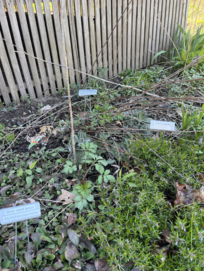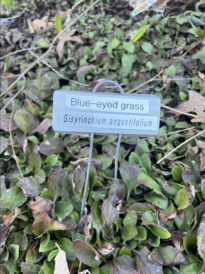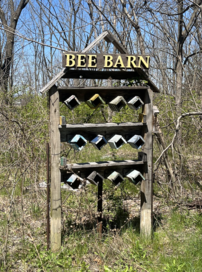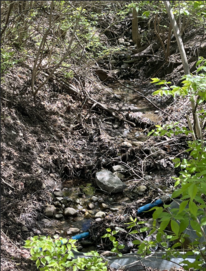Shannon Corbett, Owen Vincent, Kera Gillette, Claire Wallace, Julia Demskie
Our group collaboratively chose to dive deep into “The Ponds”, Versions A-E, E-F, and F-the Princeton Edition while making revisions of Walden’s work within the paragraphs of the passage.
Between Versions A and E of this section of “The Ponds”, we see the emergence of part 1b as an added revision. There are many possible reasons why Thoreau may have made these varying revisions, and omitted and added certain sections. The examination of these revision choices tells us more about his composition process and the mindset he grappled with through the completion of Walden. Through the analysis of these revisions, my focus will be on looking through the lens of Thoreau and determining which themes and thought processes he may have been trying to convey through the addition and omission of varying lines. It is apparent throughout all of “The Ponds” that Thoreau is examining this complex relationship between humanity and the natural world. He grapples with the limitations of the human experience and how nature can find a place within that. The first revision that we see within this section is the readmission of section 1b which was originally present with the Princeton edition. I spent some time reflecting on why he may have taken this section out, as it was omitted through versions A, B, C, and D. My guess is that Thoreau was grappling with how the Huckleberry section would be perceived. He writes, “It is a vulgar error to suppose that you have tasted huckleberries who never plucked them from the bushes” replacing “where they grew” with “the bushes” and “picked” to “plucked”. These minor revisions were likely for clarity, however, the re-addition of this section seems to harp on the inability of a person to truly taste or experience a piece of nature (in this case huckleberry) without experiencing the environment of its origin. He writes that the way to know the true flavor of a huckleberry would be to ask a “cowboy” or a person who understands the complexities of its beginnings. Thoreau may have omitted this section across previous parts because of its critical nature in condemning consumers for experiencing small glimpses of nature without fully understanding their beginnings. I don’t believe Thoreau intends to come off as critical and condemning to the consumer, but instead is trying to convey his views of intentional living and straying away from materialism. This may have been readded with the omission of the line “What are the huckleberries on the market? He that would know their flavor must taste them on the hill. Ask the huckleberry bird” in an attempt to make the theme of anti-materialism less harsh to the reader, while still getting his message across. This omitted line is reinforcing to the reader that without trying an organic substance in nature, you will never fully taste the beauty and complexities that lie within it. I believe this line was a good addition, and the removal of it slightly takes away from his overall message. He removes and adds several pieces that are present further within section 1b, crossing out the lines that discuss the “ambrosial part” of a fruit that contributes to its immortal taste but keeping the lines that depict this immortality as rubbed off in the market cart. He’s stating that once taken out of nature and moved into a commercial setting like a marketplace, this natural immortal quality is removed from the fruit. The final line added to this section talks about the reign of eternal justice and seems to have been added to contribute a final conclusion to this idea of nature vs the material.
Thoreau made few changes that are made to “The Ponds” paragraph 1 from Version E to Version F, but those that are made are significant. Some of such changes are made with the aim of shortening his prose. For instance, when describing the landscape that he explored in search of fresh huckleberries and blueberries, Thoreau deleted the words “and solitary swamps and meadows.” Likely this edit was made to avoid redundancy; he had described the area as “unfrequented” already in the passage, and referred to his isolation many times throughout the rest of the manuscript before this point. Therefore, cutting this part of the description was an easy way to shorten a wandering sentence. He also omits the pronoun “I,” presumably for a similar reason of shortening the sentence. Another example of edits for the sake of manageable length comes when the phrase “the ambrosial part of the fruit, that which feeds the genius. for every good fruit has its ambrosial part that which makes the taste immortal to a degree” is deleted from Version E. It is then replaced in Version F with only “the essential & ambrosial part of the fruit….” It’s possible that Thoreau omitted this section for the purpose of making the section shorter, but it is also particularly interesting that he replaced the entire description with only the word “ambrosial.”. The term specifically still captures his previous reference to the taste as “immortal,” as it still makes the connection to godly figures or deities.

Thoreau also makes several edits that emphasize the main purpose of both this particular passage, and the larger work of Walden. For example, he asserts in Version E that “the fruits do not yield their true flavor to the mere purchaser of them….” In Version F, however, the word “mere” is left out. This could possibly be to avoid a tone that could be construed as condescending, which is a criticism he has often been subjected to in the reception of the book. By describing this audience this way, he could alienate readers, by making them believe that he views them as inferior. In suggesting that people should eat huckleberries straight from the bush as a way to connect to nature in its purest form, regarding the “purchaser(s)” he is advising in a neutral way may help Thoreau to get his message across more effectively. He prioritizes the moral of the passage once again with the addition of a final sentence. In Version E, “As long as Eternal Justice reigns not one innocent huckleberry can ever be transported thither from the country’s hills” is inlined in pen at the end of the passage. In Version F, it is included in the first version of the main body text. This sentence serves as a fitting conclusion to a paragraph whose main purpose is to convince the reader that eliminating the commercialization of natural commodities will enrich one’s experience of life and sensory inputs. Thoreau also makes revisions to specific words which serve to make the passage more succinct and effective. In one sentence, he changes “one way to obtain them” to “one way to obtain it,” altering the meaning of the sentence entirely. In Version E, the phrase suggests that there is only one way, or perhaps rather one correct way to acquire the huckleberries themselves. In Version F, however, Thoreau instead claims that there is only one way to experience the “true flavor” of the fruit that he refers to in the previous sentence. This is a significant difference, because it aligns more closely with his purpose for the passage as a whole. He means to say that, while one could technically purchase huckleberries at a market, they are much better when they are found and harvested naturally. A clear example of this type of revision exists later still in the passage. In Version E, the fifth sentence of the passage reads “It is a vulgar error to suppose that you have tasted huckleberries who have never picked them…,” and then depicts “picked” being deleted, and “plucked” being added in its place in pencil. The word “plucked” is then what is seen included in the next reproduction of the sentence in Version F. Thoreau likely felt that “plucked” gave an image more accurate to the experience of picking the berries, or perhaps that it evoked more of a distinct image in the mind of the reader.

When comparing the revisions of paragraph 1 in “The Ponds,” there are noticeable differences between Version F to the final published version. While the passage remains relatively stationary in size, there are certain lines that have been removed and tweaked by Thoreau to create his finished product. The first example is in the fourth line after the quotation, “to fresh woods and pastures new.” In Version F, he originally has an observation where he describes the unfrequented parts of the town, “and solitary swamps and meadows.” He removes the “I” at the next comma, and continues on, “made my summer of huckleberries and blueberries on Fair Haven Hill, and laid up a store for several days.” Here, he doesn’t add or change the wording of his sentences but rather removes certain descriptions and grammatical errors that do not seem necessary to the overall piece. It’s possible that Thoreau felt his sentence was getting too long, as it is a run-on sentence that went on for five lines, and the passage flows better without them. In the next few lines, there are similar revisions, where Walden removes words like “mere” and “how” and replaces the word “them” with “it.” These appear to be grammatical corrections that Thoreau does not change until he is writing and organizing the final copy. Later in the paragraph, there are much greater and more noticeable changes that Thoreau makes beginning with, “ If you would know the flavor of huckleberries, ask the cow-boy or the huckleberry bird partridge,” where he removes the words huckleberry bird. A partridge is already a kind of bird in itself, and by ‘huckleberry bird,’ Thoreau appeals to be referring to the birds that eat huckleberries, so including two words that are synonymous also falls into the category of grammatical corrections and an error of repetitiveness that Thoreau did not want to include. The next sentence has significant changes in which Thoreau removes about three lines of writing. In the both copies he writes, “It is a vulgar error to suppose that you have tasted huckleberries who never plucked them,” however in Version F, he continued the sentence, “from the bushes,” he revised, “where they grew,” then removed again. “What are huckleberries on the market? He that would know their flavor must taste them on the hill. Ask the huckleberry bird.” Thoreau often says that he is rambling when he writes, and that may be a possible reason for why he decided to take out these few lines. He keeps referring back to the “huckleberry” in this paragraph and perhaps he felt his words were getting repetitive and by removing certain lines, he is eliminating redundancy. In his next line, he says that huckleberries haven’t grown in Boston, “since they disappeared from Beacon Hill last.” This line is then removed and replaced with, “since they grew on her three hills.” Here, Thoreau might have thought he was being too specific with the location, and he may have realized that huckleberries grew in other parts of Boston as well. He references the three prominent hills of Boston, known as Beacon Hill, Bunker Hill and the Blue Hills. In the next line where he describes the taste of a huckleberry, he says the “ambrosial” and adds, “essential” part of the fruit “is lost with the bloom which is rubbed off in the market cart, and they become mere provender.” Looking back at Version E, Thoreau only describes the fruit as ambrosial and then goes on to explain that it has a nearly “immortal” taste. Rather than ramble on about this, he sums up this sensory experience as “essential” to the huckleberry fruit. Finally, in the last sentence, “As long as Eternal Justice reigns not one innocent huckleberry can ever be transported thither from the country’s hills,” Thoreau removes the word “ever” in Version F as to produce his final copy in the Princeton Edition. This appears to be a final attempt at shortening the piece and making final corrections for the finished product. These edits highlight the fact that Thoreau was putting consideration into revising his work, as long and disarranged as it may appear to the readers.






